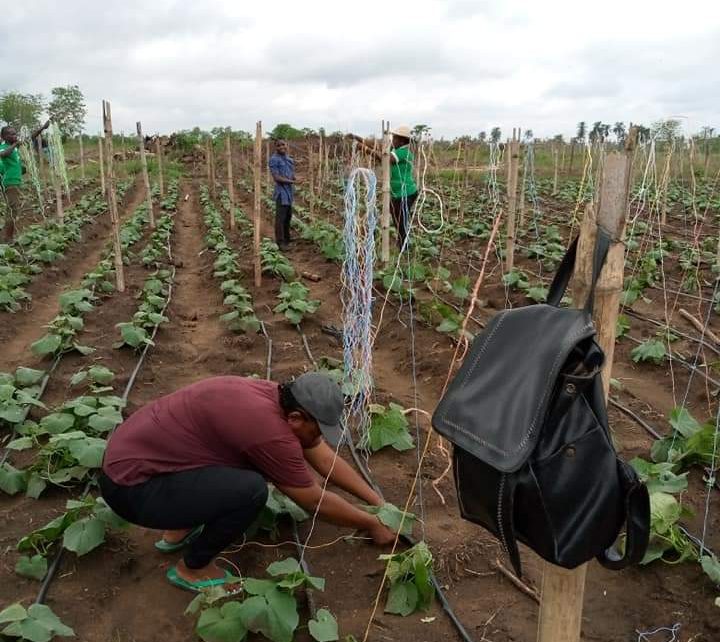By Ukpong Ukpong
Now, the euphoria of winning the gubernatorial contest and being sworn into office is subsiding, the governor, His Excellency (Pastor) Umo Bassey Eno, is expected to hit the ground running (just as he promised during campaigns) because in less than four months he should be commissioning projects to mark his first 100 days in office. What he does, whether by policy statements, body language or appointments, within this period will be seen as pointers to how his administration will look like. Being an entrepreneur, he could achieve remarkable feats such as taking more than 1000 youths off the labour market within 100 days! That’s not impossible. Yes, he can do it. Infact, more than 1, 000 people can be gainfully employed in 100 days. They could even become employers of labour within a year of working. We’ll find out how in this article.
It’s not true there are no job opportunities in Akwa Ibom State. Jobs are everywhere. It depends on where one looks and which job one seeks. What plagues our state is not lack of jobs but the erroneous belief that until one gets employed into civil service or is appointed into public office he or she is not ‘gainfully employed’. Unfortunately, we inherited this mindset from colonial administration which corroded our culture of enterprise and sense of pride in self-employment. A lie the whiteman sold to us lingered, giving grossly misplaced prestige to white collar jobs whereas in their land free enterprise especially agriculture and innovation plays major role in development.
If one may ask, how much does a civil servant of grade level 12 in the state civil service take home in a month? Approximately ninety five thousand Naira (N95, 000. 00) only. A phone repairer also selling accessories by Ibom Plaza can make this within 3 weeks. Ninety five thousand Naira is about 10 baskets of tomatoes or 12 bags of cucumbers. Half a hectare of land anywhere in this state can produce 75 bags of cucumbers in 6 weeks. Yet, farmers are considered underemployed!
As was pointed out earlier, society can’t be blamed for such a wrong perception because even government institutions make similar mistakes. For instance, in its Q2 report of 2020, the National Bureau of Statistics (NBS) pegged Akwa Ibom state’s unemployment rate at 45.2 per cent, saying it ranked second among states in the country with the highest rate of unemployment’. This report which was rightly refuted by government gave an unrealistic view of the situation in the state. The then Commissioner for Information and Strategy, Comrade Iniobong Ememobong, while reacting to NBS report argued that a juxtaposition of the said report with the reality of efforts made toward getting citizens employed would bring the obvious conclusion that indeed the then administration created quality jobs in an unprecedented manner.
This argument cannot be faulted because considering NBS’s parameters of analysis namely the employed, comprising those working for 40+ hours per week; the underemployed, comprising those working between 20 to 29 hours per week; and the unemployed, comprising those working below 20 hours per week, there is no doubt that NBS based its statistics on a false premise that only those working in the formal sector are employed. Yet, it failed to recognised that a large chunk of Akwa Ibom population is engaged in the informal sector.
Furthermore, this colonial mindset is responsible for the unnecessary pressure on government to ‘create jobs’ whereas job opportunities are everywhere. It’s on this note that I sympathize with Governor Umo Eno, who lamented during the recent commissioning of the ultramodern Dakkada skills acquisition center in Ikot Adaidem – Ibiono Ibom that his mobile phone has crashed due to text messages and calls from appointment seekers. Perhaps to reassure those hounding him for appointment, he declared in his inaugural speech that “we will create the enabling environment for our youths to thrive, since every one cannot be given appointment.”
Incidentally, solution to so-called unemployment in Akwa Ibom State is clearly spelt out in Umo Eno’s ARISE Agenda only if he would focus on investing, not only heavily but wisely, in the agricultural sector in order to cause his envisioned food revolution. The governor should learn from mistakes of his predecessor and invest cautiously. Yes, agriculture is the new black gold, but just as any gold rush attracts the good, the bad and the ugly, there are crooks and swindlers posing as farmers, investors and entrepreneurs waiting to cash out from government investment in the sector. Recall that there were several lofty projects and programs initiated by the last administration which could have really benefitted the state, but were run aground by fake investors in collaboration with government officials. Me thinks the major challenge the past administration had was its lack of due diligence and poor oversight on its projects and programs.
That said, let’s now consider how to employ more than 1000 eligible citizens within the governor’s first 100 days in office. It doesn’t need a knowledge of rocket science to understand that investing in fast yielding vegetables could employ vast number of people right from farm to the market. The entire value chain of one single vegetable such as tomato that takes less than 90 days from planting to harvesting could employ 1,085 people across the state. Here is how it could be done. It takes 7 people to cultivate a hectare of tomato farm. If 5 hectares of tomato farms are set up across 31 local government areas that will amount to 1, 085 people employed with good pay. Meanwhile, a hectare of tomatoes should have 200 beds (30cm x 40m) each having at least 90 stands of tomatoes. During harvest 90 stands of tomato is expected to produce at least 90kg fruits. So, 200 beds will then produce 90 x 200 equals 18, 000kg (18 tonnes). If the market value of 1kg tomatoes is N200 then 18000kg will be sold for N3, 600, 000 which can pay three months salary of 7 workers per farm at national minimum wage, take care of some expenditure and break even by the following planting season. There are more of such low hanging fruits in the AK-SEEDS doctrine.
WHAT DOES AK-SEEDS PROPOSE?
Akwa Ibom Smart Empowerment and Enterprise Scheme (AK-SEEDS) seeks to build on already established foundation towards food sufficiency and wealth creation. The overall goal is to institutionalize commercial vegetable production in Akwa Ibom State. To achieve this, the scheme must carefully identify, select and further groom dedicated vegetables farmers who will become arrowheads of production clusters in each of the 31 Local Government Areas, providing business hubs to drive employment and create wealth along an established value chain.
AK-SEEDS will take a different approach from past training schemes by adopting strict selection process. It will conduct regular cognitive assessments as well as administer attitude, inner drive and stress tests throughout the programme to identify the most determined youths. After training, they will be screened again and organised into cooperatives in order to access the next level of the scheme namely loaning. Funds will be realeasd to these cooperatives to cultivate their crops under supervision for two planting seasons. A number of trainees will be further trained and deployed to manage offtaking and processing units.
To be continued….





